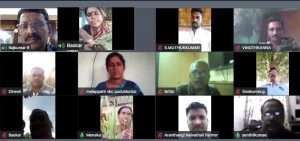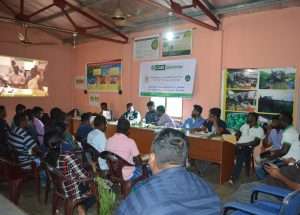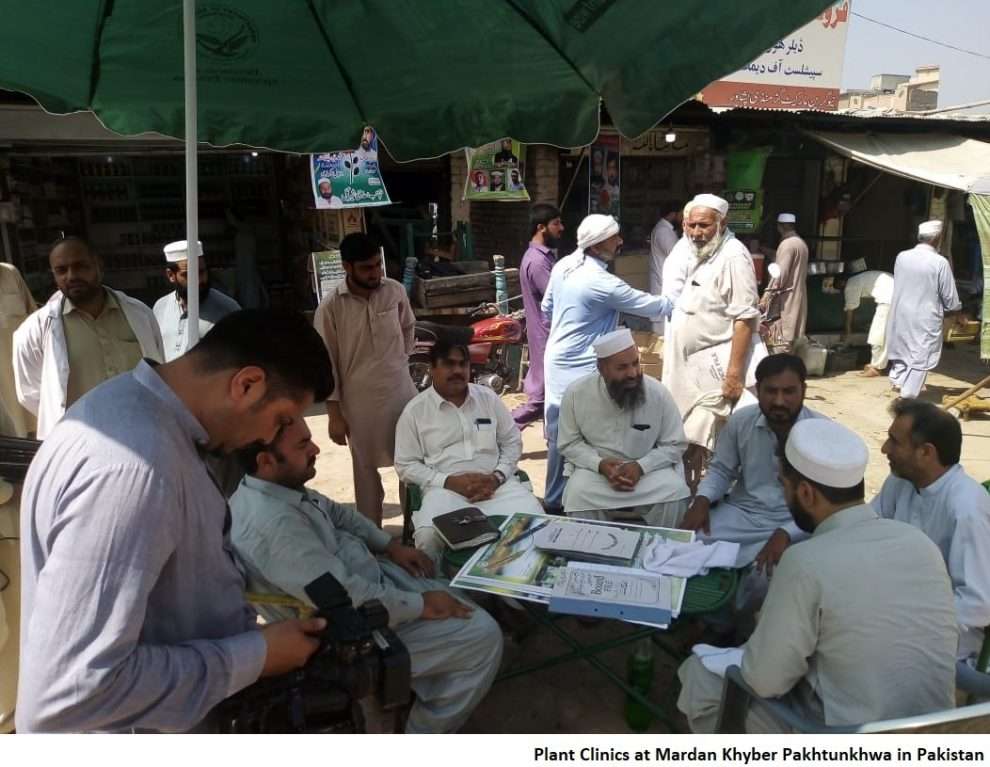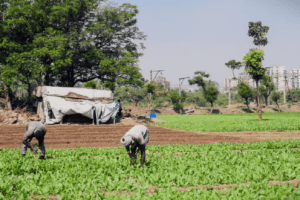E-Plant clinics are meeting places where local agricultural advisory officers, known as plant doctors, help farmers struggling with plant pests and diseases. During the COVID-19 pandemic, plant clinics continued to provide advisory services to farmers by going online. Malvika Chaudhary shares her knowledge here.
CONTEXT
COVID-19 has brought the world to a near standstill. The daily rush to the office, school, and various other destinations that engaged people has suddenly telescoped into the recently adopted term – ‘lockdown’. Yet, when all other activities took a back seat there was one routine that thankfully continued as it was for a large percentage of the world’s population, that is, our three square meals per day. While a few of us are reassured by national politicians that the lockdown would not affect our jobs, there is one service giver, the farmer, who relentlessly and irrespective of the situation is striving and continuously contributing to national food security. Even at this time farmers must produce sufficient food, and they still need inputs, and most importantly, advice. This blog is about how CABI Plantwise (Box 1) has come forward to support farmers with advice during this pandemic, through its network of plant clinics.
| Box 1. CABI Plantwise
CABI Plantwise (https://www.plantwise.org/) is a global food security programme wherein efforts were directed to skill extension workers to give functional recommendations based on early field diagnosis through a network of plant clinics. Over a decade, with its experience and growing engagement with diverse partners, Plantwise has evolved to reach out to more than 44.1million farmers through 175 partnerships with public, private, as well as civil society organizations in more than 30 countries. Plant clinic networks continue to grow; currently, about 11,500 trained plant doctors and extension officers provide advisory services to farmers through over 3,000 plant clinics. |
EXPERIENCES
In Asia, Plantwise has been operational in ten countries whereCOVID-19 has especially hit hard – in South and East Asia, especially China. With restrictions on movement and mass gatherings, plant clinics appear impossible. On deeper introspection various innovative ways to reach out to farmers were identified, and currently plant doctors are delivering effective services online with the use of ICTs.
For instance, in China, trainings tore fresh the knowledge of plant doctors were carried out virtually by the Beijing Plant Protection Service. The presentations covered application techniques in controlling natural enemies and pollinator products in vegetables, diagnosis and management of bacterial diseases in vegetables. More than 420 plant doctors (168 females and 252 males) from 12 districts of Beijing participated in the online training.
In Pakistan where Plantwise is completely built into the extension services of the Provincial Government of Punjab and Sindh, the COVID-19 situation did not stop the plant doctors from giving advice to over 6000 farmers in the period of April-May. Plant doctors continued to exchange their experiences through cluster meetings and online consultations with national partners, which CABI coordinated.
During the COVID-19 lockdown, Indian farmers have been able to join ‘e-clinics’ to get a diagnosis for the problems plaguing their crops, thus helping limit the damage. Approximately 30 physical clinics across five Indian states have now been replaced by online ones. So far seven sessions – during the lockdown – have seen more than 350 farmers participate from Tamil Nadu, Odisha, Assam and Puducherry. The farmers could not afford to neglect any disease, as their lockdown losses would also impact their activities in the next cropping season.
The plant doctors of MSSRF (a Plantwise partner in India) have been able to provide timely advice via the web to farmers who showed them samples of damaged crops. After seeing it they advised them on how the problems could be addressed and where they could buy the needed inputs to address specific problems. Encouraged by these experiences, the plant doctors now feel virtual clinics could expand their reach tremendously in the future. The only concern is that farmers have to learn to use the technology better. For example, they need to figure out how to hold the plant in front of the camera without blocking it, so the plant doctors can diagnose the problem. If other issues and internet connectivity are resolved, this mode could support plant doctors in reaching thousands of farmers, and thus resolving issues in real time.

Online plant clinic consultations offered by plant doctors to the farmers of India
Our experiences in Nepal during the pandemic have been both positive and negative. On the positive side, this difficult time has made us realize the value of coming together and being connected as a community. IDE in Nepal has teamed with PW to train its community-based facilitators (CBFs) as Plant Doctors. These CBFs are instrumental in bringing knowledge and inputs to the doorstep of farmers. IDE Nepal teamed up with CABI Plantwise and government agencies to host a workshop on the validation of plant clinic data contained in the Plantwise Online Management System (POMS). This was done online – bringing stakeholders of India and Nepal together for knowledge exchange and learning. The validation of clinic data is equally important in order to record the quality of services provided by CBF plant doctors. Hence this workshop was a success considering the learning gained, and it was also a beneficial platform for strengthening coordination with government bodies, and for inter-country experience-sharing with the ultimate goal of providing superior services to smallholder farmers.
Other South Asian Countries where the pandemic was wide spread but still had noticeable support from Plantwise was Sri Lanka and Bangladesh. In Sri Lanka the concept ‘Doctor on Skype’ was popular in pandemic times. CABI initiated a Skype clinic for one of the Young Farmer’s Club in Mullaithivu in Sri Lanka, in association with the National Agriculture Information and Communication Centre (NAICC), Department of Agriculture (DoA). By embedding growing communication technologies and bringing experts into the existing plant clinics remotely, DoA has started this Skype service. Farmers brought along a range of plant samples, including those with more difficult or complex problems, all of which were shown to the experts via Skype video call. To ascertain as much background information as possible, the experts asked sets of questions which the farmers were quick to answer.

Skype clinic being held in Sri Lanka to extend services to remote areas
Even during the COVID lockdown, news channels buzzed in Bangladesh on the arrival of swarms of an unknown pest that were partially covering mango and guava crops, as well as some forest trees in Teknaf Upazila, Cox’s Bazar District. The Ministry of Agriculture (MoA), Bangladesh, took immediate steps and a team from Department of Agricultural Extension (DAE), Bangladesh Agricultural Research Institute (BARI), and others from the National Agricultural Research System (NARS) rushed to the site to safely collect samples, in order to identify the pest and take immediate steps for its management. After uploading pictures on social media the insect was identified as ‘Spotted Coffee Grasshoppers’. Though it is not a new pest in Bangladesh, it had never previously been seen in such huge numbers, so much so that it overwhelmed farmers. Plant wise in Bangladesh supported its partners, DAE, with help through an online workshop with Bangladesh Agricultural University and media experts to draft a Pest Management Decision Guide (PMDG) for the country.
At this time when many countries are in lockdown, social media is an effective channel, and this is true in Bangladesh especially, to disseminate information. There are several WhatsApp groups with more than 3,000 members, and Facebook pages which include not only extension officials but several farmers’ associations. The PMDG is being disseminated through these communication channels and will thus reach a wide number of farmers that need it the most – particularly now when physical plant clinics are not operating.
END NOTE
During these troubled times, farmers have difficulty in getting information on new/existing pests and diseases. The extension wing of Agriculture Departments of various countries are striving hard to reach out to all farmers with input and knowledge. Plant wise is working continuously to support governmental and non-governmental partners to develop sources with functional information and thus complement their functioning. ICT is the main driving force which is helping in implementation and monitoring. Efforts are directed at overcoming the difficulties that smallholder farmers are facing in pandemic times in the best possible way.
References
https://blog.plantwise.org/2018/02/28/sri-lanka-launches-skype-service-to-further-strengthen-advisory-support-in-plant-clinics/
https://blog.plantwise.org/2020/05/13/spotted-coffee-grasshopper-in-bangladesh/
https://blog.plantwise.org/2020/06/25/lockdown-unlocking-technology-for-indias-farmers/
https://blog.plantwise.org/2020/05/20/pests-in-a-pandemic-india-plant-doctors-will-see-you-online-now/
Acknowledgements
The author wishes to express her gratitude to all the donors of Plant wise, i.e., DFID, DEGIS, SDC, Agriculture and Agri Food Canada, ACIAR Ministry of Agriculture and Rural Affairs China. She also wishes to acknowledge the national partners of the above mentioned countries; and CABI country coordinators – Dr Vinod Pandit, Dr Naeem Aslam, Dr Min Wan, and Sudhanshu Jain for their contributions.

Malvika Chaudhary is Regional Coordinator, Plantwise Asia, CABI.
(Email: m.chaudhary@cabi.org)





Add Comment